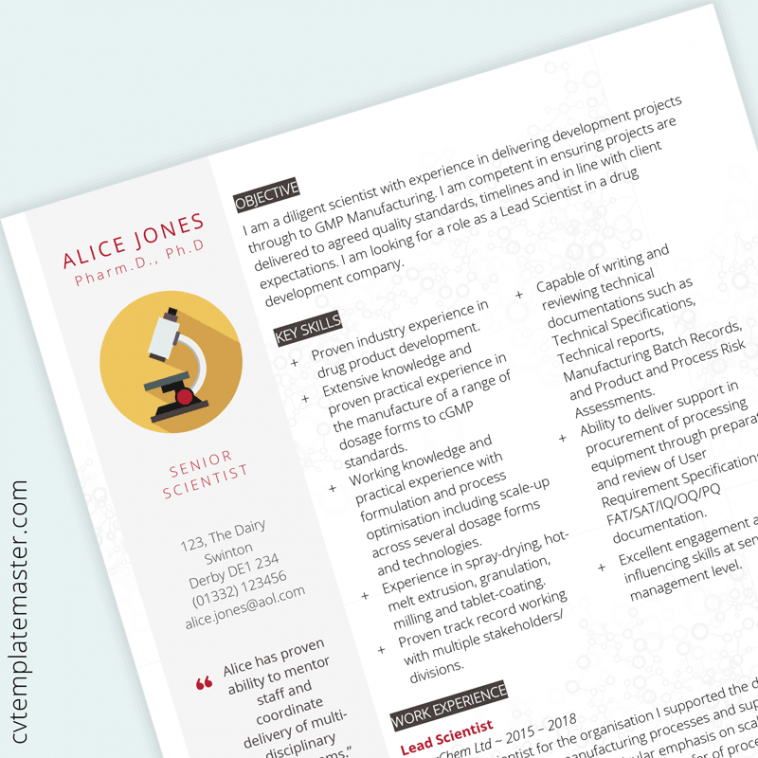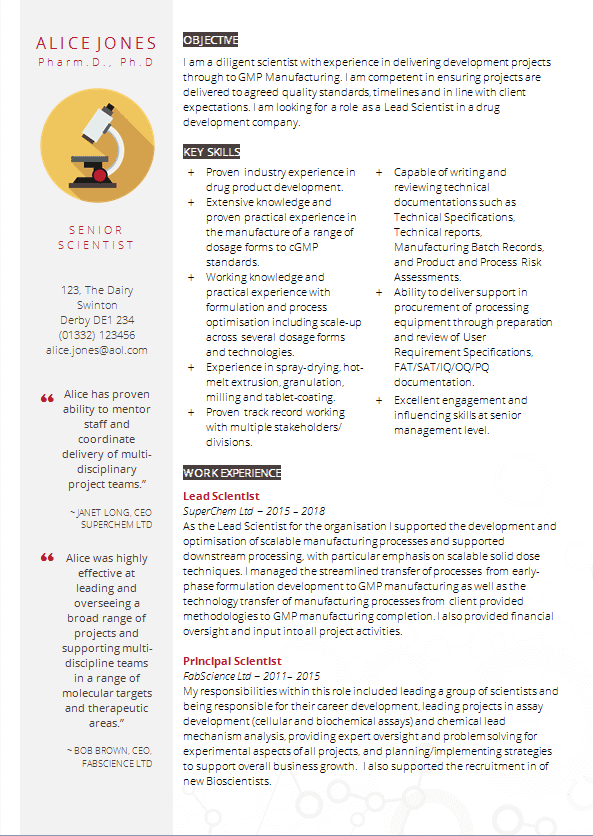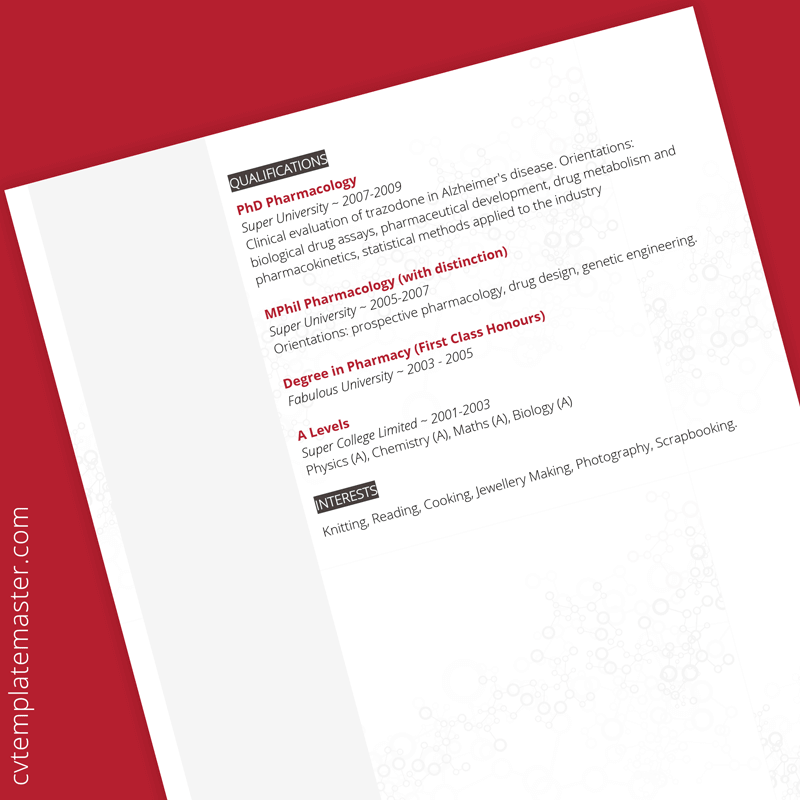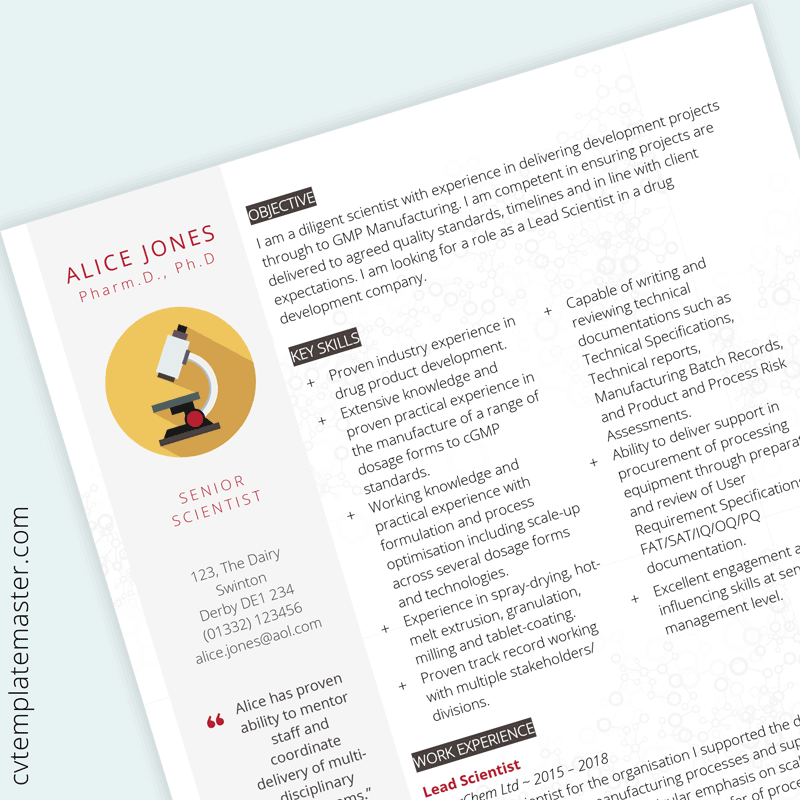Text preview of this CV template:
This is a text-only preview - download the formatted Word file using the link above.
ALICE JONES
Pharm.D., Ph.D
SENIOR SCIENTIST
123, The Dairy, Swinton, Derby DE1 234 | (01332) 123456 | alice.jones@aol.com
“
Alice has proven ability to mentor staff and coordinate delivery of multi-disciplinary project teams.” ~ JANET LONG, CEO SUPERCHEM LTD“
Alice was highly effective at leading and overseeing a broad range of projects and supporting multi-discipline teams in a range of molecular targets and therapeutic areas.” ~ BOB BROWN, CEO, FABSCIENCE LTD
OBJECTIVE
I am a diligent scientist with experience in delivering development projects through to GMP Manufacturing. I am competent in ensuring projects are delivered to agreed quality standards, timelines and in line with client expectations. I am looking for a role as a Lead Scientist in a drug development company.
KEY SKILLS
- Proven industry experience in drug product development.
- Extensive knowledge and proven practical experience in the manufacture of a range of dosage forms to cGMP standards.
- Working knowledge and practical experience with formulation and process optimisation including scale-up across several dosage forms and technologies.
- Experience in spray-drying, hot-melt extrusion, granulation, milling and tablet-coating.
- Proven track record working with multiple stakeholders/ divisions.
- Capable of writing and reviewing technical documentations such as Technical Specifications, Technical reports, Manufacturing Batch Records, and Product and Process Risk Assessments.
- Ability to deliver support in procurement of processing equipment through preparation and review of User Requirement Specifications, FAT/SAT/IQ/OQ/PQ documentation.
- Excellent engagement and influencing skills at senior management level.
WORK EXPERIENCE
Lead Scientist
SuperChem Ltd ~ 2015 – 2018
As the Lead Scientist for the organisation I supported the development and optimisation of scalable manufacturing processes and supported downstream processing, with particular emphasis on scalable solid dose techniques. I managed the streamlined transfer of processes from early-phase formulation development to GMP manufacturing as well as the technology transfer of manufacturing processes from client provided methodologies to GMP manufacturing completion. I also provided financial oversight and input into all project activities.
Principal Scientist
FabScience Ltd ~ 2011– 2015
My responsibilities within this role included leading a group of scientists and being responsible for their career development, leading projects in assay development (cellular and biochemical assays) and chemical lead mechanism analysis, providing expert oversight and problem solving for experimental aspects of all projects, and planning/implementing strategies to support overall business growth. I also supported the recruitment in of new Bioscientists.
QUALIFICATIONS
PhD Pharmacology
Super University ~ 2007-2009
Clinical evaluation of trazodone in Alzheimer’s disease. Orientations: biological drug assays, pharmaceutical development, drug metabolism and pharmacokinetics, statistical methods applied to the industry
MPhil Pharmacology (with distinction)
Super University ~ 2005-2007
Orientations: prospective pharmacology, drug design, genetic engineering.
Degree in Pharmacy (First Class Honours)
Fabulous University ~ 2003 – 2005
A Levels
Super College Limited ~ 2001-2003
Physics (A), Chemistry (A), Maths (A), Biology (A)
INTERESTS
Knitting, Reading, Cooking, Jewellery Making, Photography, Scrapbooking.
Some of the content in this CV template has been adapted from: Adzuna
Template details:

Here’s a full preview of page one of this science CV template:

Here’s page 2 of this super-smart science CV template:

The 3 biggest mistakes you can make on your Science CV:
You only have one chance to make a great first impression, so if your CV is making just one of these mistakes you are going to struggle to find an employer that wants to interview you.
Your CV is typically the only way an employer can judge whether you are the right person for the job or not before the interview stage, and with just a two page document you have to get it right the first time otherwise you’ll never know why you’re not getting through to the next stage.
If you’re having problems getting an interview or you would like to ensure your CV is of the highest quality, here are the 3 biggest mistakes you can make on a CV:
1. Using cliché statements
Q: What is a cliché statement and why would this affect my science CV?
Here’s an example of a cliché statement often seen on a CV:
‘I have fantastic communication skills and am able to work well as part of a team’.
We’ve all used them at some point, and a few years ago you’d probably get away with stating something like that. These days however you have to actually backup any claims with actual examples and results, as employers are now a lot wiser to the fact that anyone can write this but it doesn’t mean to say it’s true.
Due to the sheer amount of information and advice that’s available now online, the quality of the CV has risen dramatically over the past few years. With the help of CV templates and additional guides to help write the perfect CV, the employer is now also looking for something very special to stand out from the already high standard of applications they receive on a daily basis.
Cliché statements are just not going to cut it any more, and rather than using a generic statement you should look to prove your worth by providing some great examples of your past performances. An employer is not stupid, and they don’t need you to point out the obvious if you can clearly demonstrate you have what it takes within your CV.
2. Simply listing the tasks and responsibilities
So you’re probably thinking – what’s wrong with that? Sure, you are meant to list your tasks and responsibilities underneath your previous job titles, but there is a lot more to completing your employment history section than simply stating the obvious.
When the hiring manager reads your work experience section they are looking to see how you performed, and the daily tasks are only a part of the process of getting to know your work habits. Instead, you should look to offer more of an insight into what you’ve been up to the past few years.
Don’t fall into the trap of simply listing every single task for all of your previous roles, as this will just be a waste of valuable space. Only focus upon your most recent and relevant roles, as this is of interest to the employer. Earlier roles that have little to no relevance to the new position should have as little detail as possible, allowing you to expand much more on the relevant jobs. But there is still much more to what an employer wants to see.
Alongside the tasks you should also highlight your performance by including problem solving situations, ideas you generated, revenue you increased, sales you made, targets you hit, goals you achieved, and anything else you feel could be classed as outstanding performance.
Most of the tasks you list for each job title could easily be guessed anyway, so try to go that extra mile and actually showcase your performance to the employer. That’s what they really want to know!
3. Writing a generic science CV
In the olden days you would get away with writing just the one CV and sending it out to many different employers, regardless of whether it was for a similar role or not. That was fine back then, but certainly not any more! It doesn’t matter if you are applying for the same job title – you should always tailor your science CV to the role and the employer.
Every time the hiring manager picks up a CV they want to feel like the applicant is passionate and determined to get the role, and that they want to work for the company and understand what their goals are. You can only make them react like this if you tailor your CV each time you send it off.
Each job advert you come across will be different, even though the job titles are the same or similar. An employer will always have a different culture to another, and will want and expect different things from their employees. Sure, there will be similarities – similar skills required, qualifications and work experience; but that doesn’t mean to say that your CV should remain the same.
If you really want to stand out from the rest of the competition and secure yourself an interview, then don’t be afraid to put that extra bit of effort in to get yourself noticed. It’s always worth it, and any slight edge you can have over the other applicants is what’s important at the end of the day.
Find out more about tailoring your CV to the job advert.
Bonus TIP: Joining a professional body (and mentioning this on your CV) can help demonstrate your passion for the sciences industry. Click here for a great list of suggestions from the Science Council.
